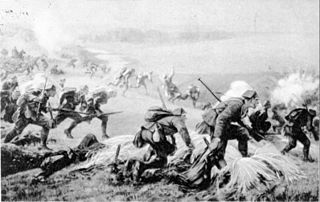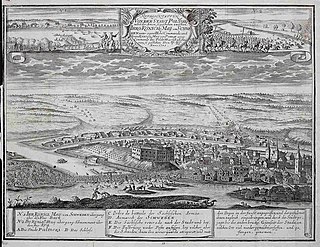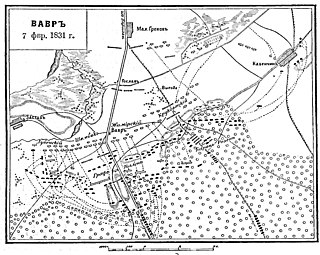 W
WThe Battle of Boryspil happened on June 2, 1920, near the town of Boryspil near Kiev. It was fought between the Polish and Russian forces during the Polish-Bolshevik War and was a part of the Polish counter-assault after the ill-fated Russian offensive of May 27.
 W
WThe Battle of Jastków was a World War I battle that took place July 31–August 3, 1915, near the village of Jastków, then part of the Russian Empire. It was a major clash between the Russian Army and the Austro-Hungarian Polish Legions. It was one of the Legion's largest engagements, and its first major one. The battle ended with the Austro-Hungarian and Polish victory, as the Russian forces retreated.
 W
WBattle of Loyew, was a battle of the Khmelnytsky Uprising. Polish-Lithuanian Commonwealth forces under the command of Janusz Radziwiłł defeated the Cossack forces under the command of Martyn Nebaba.
 W
WThe Battle of Miechów took place on February 17, 1863, near Miechów in Małopolska, Poland, during the January Uprising.
 W
WThe Battle of Nakło (1109) was fought between the forces of the Kingdom of Poland and Pomeranian tribes at Nakło nad Notecią. The Polish troops were led by Duke Bolesław III Wrymouth.
 W
WThe Battle of Pułtusk took place on April 21, 1703 in Pułtusk during the Great Northern War. The Swedish army under the command of Charles XII defeated the Saxon army under Adam Heinrich von Steinau.
 W
WThe Battle of Rajgród was a battle fought on 29 May 1831 between Poland and Imperial Russia, during the November Uprising. The Poles, according to some accounts, were victorious.
 W
WThe Battle of the Vedrosha River was a battle in the course of the Russo-Lithuanian war of 1500–1503 which ended with a decisive Russian victory and proved to be of strategic significance. It was carried out on 14 July 1500, some 50 km to the west of Kaluga, between forces of the Grand Duchy of Lithuania, under command of Prince Konstantin Ostrozhsky and Russian (Muscovite) army under Prince Daniil Shchenya.
 W
WThe Capture of Daugavgriva by Swedish forces in July 1608 occurred during the Polish–Swedish War (1600–1611).
 W
WBattle of Ciołków of January 22, 1863, was the first skirmish of the January Uprising. Fought between an unorganised Polish troop of ca. 100 men under Aleksander Rogaliński and a company of the Russian Murom Regiment under Col. Kozlaninov, the skirmish resulted in Polish victory.
 W
WThe Siege of Kolding was fought on December 25, 1658, between Sweden and the forces of the Polish–Lithuanian Commonwealth and Denmark–Norway. The Polish and Danish forces were led by Stefan Czarniecki. The Polish-Danish force won the battle.
 W
WThe Battle of Małogoszcz took place on February 24, 1863, near Małogoszcz in the Holy Cross voivodeship. It was the one of biggest battles of the January Uprising. Polish general Marian Langiewicz began concentrating his forces in the Holy Cross Mountains; he wanted to attack Warsaw with them, but the Russians unveiled his attempts. He was attacked by a few Russian forces simultaneously. Langiewicz defeated them all in many skirmishes. Polish forces grew to 2,600 men. Russian colonel Dobrowolski attacked near Małogoszcz. The Russians shelled Polish positions, but their attack was eventually smashed by a Polish cavalry counterattack. Langiewicz ordered a retreat. The battle was indecisive - the Russians failed to annihilate the Polish army and the Polish failed to defend their positions.
 W
WThe Battle of Rawa was one of skirmishes of the Polish January Uprising. It took place on February 4, 1863 in the town of Rawa Mazowiecka, Russian-controlled Congress Poland. A unit of Polish insurgents under Antoni Jezioranski, and Aleksander and Franciszek Sokolowski, managed to capture barracks of the Imperial Russian Army. With several pieces of weaponry and an unknown number of prisoners, the Poles then headed southwards.
 W
WThe Siege of Danzig took place between 1655 and 1660 when a Swedish force tried to capture this important Baltic Sea port city from the Polish-Lithuanian Commonwealth during the Second Northern War. After 5 years of fighting around Danzig (Gdańsk), the Swedish force which has made little ground surrendered.
 W
WSiege of Lyakhavichy (Lachowicze) took place from 23 March to 28 June 1660 during the Russo-Polish War (1654–67). Lachowicze was one of the major Grand Duchy of Lithuania strongholds in the disputed region. A Russian army of about 30,000 under Ivan Nikitich Khovansky laid siege to the castle, defended by Mikołaj Judycki. After four failed sieges, Khovansky was forced to face a Polish relief army under hetmans Stefan Czarniecki and Paweł Jan Sapieha, and was defeated at the Battle of Polonka. This meant the end of the siege of Lachowicze.
 W
WThe Siege of Opochka was an unsuccessful attempt by the Grand Duchy of Lithuania and the Kingdom of Poland to conquer the Muscovite fortress of Opochka during the Fourth Muscovite–Lithuanian War.
 W
WThe Siege of Thorn was set during the Great Northern War, between Sweden and Saxony from May to October 14, 1703. The Swedish army was commanded by Charles XII of Sweden and the Saxon by General von Kanitz. The siege ended with a victory for Sweden, and the whole garrison surrendered to the Swedes.
 W
WThe Battle of Staszów was part of the Polish January Uprising of 1863. When the uprising erupted Staszów became a gathering place for Russian infantry and artillery in the area, on the belief that Commander Marian Langiewicz was headquartered in the town.
 W
WThe First Battle of Wawer was fought on February 19 and 20, 1831, between Poland and Russia. Polish forces, led by Jan Skrzynecki, defeated Russian 1st Corps, commanded by Hans Karl von Diebitsch. After the battle, Polish commanders did not receive any reinforcements, so the victory was not decisive.